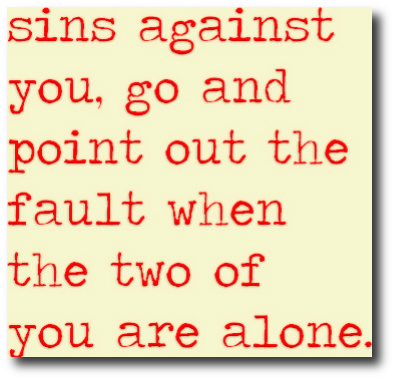You ask how the church can serve as a peacemaker, and again I must begin by admitting that I’m not sure I know what the church is. I can point to various communities and institutions that refer to themselves as churches, but they don’t necessarily recognize one another as churches. Honesty would require that we rephrase the question and ask how churches can serve as peacemakers, and then we would have to begin with a long, humble look at our divisions and confess that we have little to say about peacemaking since we can’t even recognize one another as members of the one body of Christ. We are very successful at tolerating one another, which is just another word for leaving each other alone, pretending that we have no need of each other.
I’d say the best way churches can serve as peacemakers is by being as faithful as they can in their prayers and their service, and by letting the sad reality of division and mutual exclusion bother us again and bother us enough to reach across the barren lands of tolerance between us. It is good that we no longer burn each other as heretics, but it is not good enough. Peace is not the mere absence of violent conflict or persecution; peace is the fullness of life that emerges when relationships are made right.
We heard lines from Psalm 85 today, a beautiful piece of Hebrew writing. I remember well when I first heard verses 10 and 11, I was a teenager.
Steadfast love and faithfulness will meet;
righteousness and peace will kiss each other.
Faithfulness will spring up from the ground,
and righteousness will look down from the sky.
I was a teenager when I first heard these lines, and I was deeply troubled by the lack of righteousness I had begun to see in the world.
I was upset that small farmers in Africa were losing their land and livelihoods, so that agro businesses could grow green beans for export to Europe.
I was upset that governments in the U.S. and Europe were burning corn and dumping vegetables in the ocean to keep commodity prices from falling while people in other parts of the world were starving.
I was upset that the CIA arranged for the toppling of a democratically elected government in Chile to replace it with Pinochet’s military junta.
I was upset that German banks and manufacturers continued to do business in South Africa when the injustice and violence of apartheid was no secret.
Steadfast love and faithfulness will meet;
righteousness and peace will kiss each other.
I heard those words and I saw the embrace, and the image never left me. When I think of relationships made right, I think of these verses from Psalm 85 where the pillars of God’s covenant loyalty become a promise for us.
Faithfulness will spring up from the ground,
and righteousness will look down from the sky.
The Lord will give what is good,
and our land will yield its increase.
When I think of the world at home, I think of these verses that sing, “All will be well.” All will be well between heaven and earth, between God and humankind, between individuals and nations, between people and the land. All will be well.
The psalm doesn’t begin with that serene sense of peace, though; it begins with memories. It begins in a place where God’s redemptive actions in the past are remembered, and are needed again, now. The tone is rather demanding:
Lord, you were favorable to your land;
you restored the fortunes of your people;
you forgave the iniquity of your people;
you pardoned all their sin;
you withdrew all your wrath;
you turned from your hot anger –
Restore us again! Show us your steadfast love!
Life is not the way it’s supposed to be and we need you to do something about it. Will you not revive us again?
The words come from a place where God’s redemptive actions in the past are remembered, but are needed again, now. And after this long outburst of need and insistent questioning and persistent demand, suddenly the voice and tone change.
There is a moment of silence, a long moment of listening, and a single voice says,
“Let me hear what God the Lord will speak, for he will speak peace to his people.”
A single voice calls us to listen for the voice and word of God, confident that God will speak peace to the faithful, confident that God’s salvation is not far away but at hand for those who fear God. Nothing in the psalm indicates how long the moment of listening lasts – a day, a year, a generation? And then there is this burst of beauty and imagination, of promise and trust:
Steadfast love and faithfulness will meet;
righteousness and peace will kiss each other.
Faithfulness will spring up from the ground,
and righteousness will look down from the sky.
The world will come to be the world God intends, a communion of shalom. All will be well between heaven and earth, between God and humankind, between individuals and nations, between people and the land. All will be well.
We are in Advent. We are in a time of waiting and watching, a time of staying alert and preparing to receive, again. We know something of redemption and of this God whose covenant faithfulness has been attested by generations of God’s people, and we wait for God to come again and speak peace.
Our life in the world is one of dispute and conflict, of juggling divisive issues and keeping violence at bay, and we wait. We are in Advent and we lean forward expectantly, because the world is under promise: All of creation is headed for God’s shalom.
Perhaps the most fruitful way for us to serve as peacemakers is to remember that God calls us to faithful relationship with God and with each other and with all our fellow creatures; and to remember in the ensuing debate over just how to do that, that the fullness God intends for us is not something some of us have and others don’t, but rather something we can only receive together.
Mother Teresa said, “If we have no peace, it is because we have forgotten that we belong to each other.” We may prefer hanging out with the people who are like us. We may prefer talking with the people who think like us. We may prefer worshiping with the people who share our theology or our taste in music. We may prefer living in little tribes of conformity, but all we are doing is confirm our amnesia: we have forgotten that we belong to each other. We have forgotten that the fullness God intends for us includes the people who aren’t like us, who don’t think like us, who don’t share our theology or our musical taste or our political views.
I had a conversation with a group of divinity students at Vanderbilt last week. They told me how difficult it is to put one’s theological hunches into words when everybody in the room comes from a different background – how it can be both exhilarating and very frustrating. How you have to explain so much more and be really careful about what you say about the eucharist. You don’t want to offend a fellow student who may come from a non-sacramental tradition but rather help her hear what you found to be true and how you found it.
I listened and I nodded a lot, yes, it is difficult to do theology in an environment like that. “It was much easier when I went to div school. We were all white, we were all protestants, and the entire faculty was protestant and white and mostly male. I wish I had had the opportunity to study New Testament with a Jewish woman. I wish I had had the opportunity to study with Catholics, Mennonites, and Pentecostals. When we discussed the theology of the Lord’s Supper, we thought it was great fun laughing at Catholic sensibilities and teachings. It was easy enough, there were no Catholics in the room. At the end of my time in seminary, we met for a weekend with a class of candidates for the priesthood from a Catholic seminary. The conversation changed in an instant. We suddenly realized how little we had actually thought about the doctrines we had learned to repeat, because nobody had challenged our thinking.”
Mother Teresa had it right, “If we have no peace, it is because we have forgotten that we belong to each other.” Peacemaking begins with reaching across the barren lands of a tolerance that is nothing more but a mask for our ignorance, our fear, or our lack of interest. Peacemaking begins with listening to the voice and the voices we have excluded, intentionally or not. It may be the voice of spouse or a child, the voice of a Muslim neighbor or a pro-life co-worker or the old woman who never makes eye-contact. Peacemaking begins with the invitation, “Tell me your story.”
Things are far from how they’re supposed to be, and yet God’s salvation is near. We are in Advent. We are in a time of waiting and watching, a time of staying alert and preparing to receive, again. God’s covenant faithfulness has been attested by generations of God’s people, and we wait for God to come again and speak peace.
We are in Advent. We await the divine gift of a human community that will perform its life according to the will of the Giver of life. We practice kingdom living one relationship at a time. We practice leaning forward expectantly, because the world is under promise.




















